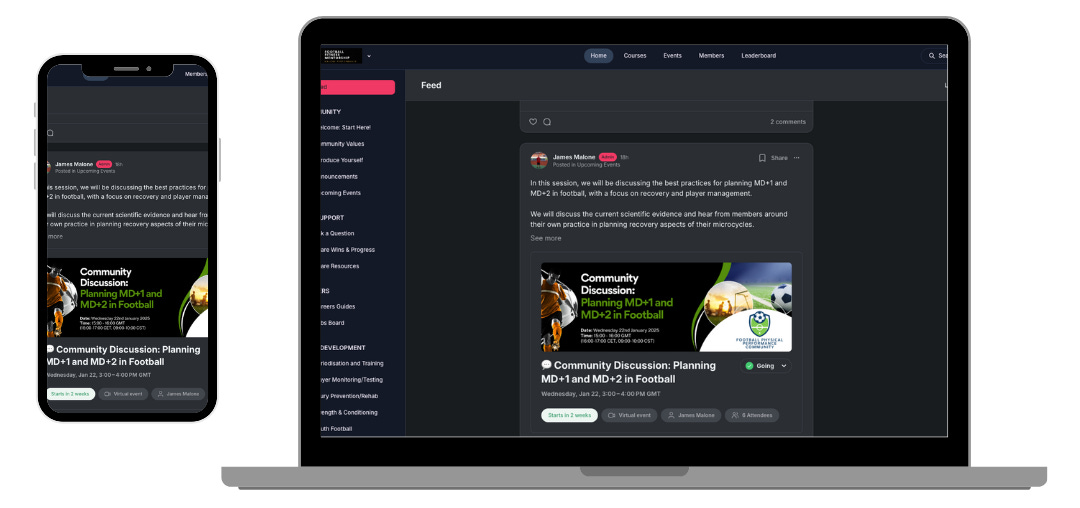How Mental Fatigue Impacts Football Performance
Physical fatigue often shows up in player movement. Mental fatigue shows up in decision-making, and it’s just as costly - even if it’s harder to quantify.
Despite its growing recognition in research, mental fatigue remains under-discussed in football. Yet evidence is clear: players who are cognitively overloaded make poorer decisions, show reduced skill execution, and report higher perceived exertion — even when physical outputs remain unchanged.
So what should practitioners know?
What the Research Says
A growing body of literature shows mental fatigue has a measurable and meaningful impact on football performance.
As part of his excellent PhD, Mitchell Smith demonstrated that mentally fatigued players made more wrong decisions in a soccer-specific decision-making task, and their accuracy dropped by 10%.
From a physical perspective, mental fatigue has been shown to reduce endurance performance coupled with a higher than normal perceived exertion.
Mental fatigue can also impact tactical organisation, with this 2020 systematic review highlighting that mental fatigue had a detrimental effect on the synchronisation between team players and on individual tactical performance in defensive actions.
Why Footballers Are Particularly Exposed
Football is not just physically intense - it’s cognitively demanding.
Players must scan constantly, make rapid decisions, communicate under pressure, and process large volumes of visual information. Now layer on external stressors such as:
Late night kick-offs and travel
Social media scrutiny
Academic pressure (for youth players)
Tactical information overload
Life transitions: moving country, starting a family, contract uncertainty
Mental fatigue often builds subtly but cumulatively, especially in environments where players aren’t encouraged to speak up about how they’re feeling mentally.
The consequences? Poor decisions, slower reactions, increased injury risk, and eventually, burnout.
How to Monitor Mental Fatigue
As it stands, there’s currently no gold standard field measure that practitioners can use to clearly monitor mental fatigue with their players.
However, recent applied research has highlighted some promising tools that may be utilised.
Subjective wellness is something that most teams routinely collect, typically using a 5-point scale based around areas such as player stress and general fatigue.
Despite its potential usefulness, such scales don’t specify or separate out the mental fatigue element from general wellness monitoring.
Recent work by Suzanna Russell has recommended the use of a 100m visual analogue scale (VAS) to rate their “current feelings of mental fatigue” on a 100mm line anchored from 0 (“none at all’) to 100 (“maximal”).
Like all subjective markers, players must understand what the assessment means - as many players likely link the word “fatigue” with physical elements rather than mental.
Cognitive tests, such as the Stroop or Go/No-Go tasks, can potentially be used on a weekly basis to understand trends in cognitive function. However, there may be some practical limitations with administering such tests to a large squad of players.
Practitioners should also watch for mismatches between external load and session RPE - i.e. when a player reports high internal effort despite a relatively low physical output. While this might suggest poor aerobic conditioning, in cases where fitness isn’t a concern, it could be an early indicator of mental fatigue.
Lastly, heart rate variability can potentially provide trends in broader fatigue states, which includes cognitive strain, but this type of assessment won’t provide specific mental fatigue insights.
Intervention Strategies
Whilst research in this area specific to football is still in its infancy, here are some potential areas that practitioners can focus on with their players to help reduce mental fatigue:
Sleep hygiene: Sleep is arguably the most effective recovery tool for mental fatigue. Prioritise it through good sleep hygiene practice and smart training scheduling in relation to match kick off times.
Cognitive tapering: Just as we reduce physical load before matches, think about cognitive load — avoid excessive video analysis or classroom tasks close to match day
Mindfulness / breathwork: These practices can reduce stress and improve focus under pressure. Might face some buy in challenges from players.
Environment design: Is your training environment noisy, chaotic, or cluttered? Reduce unnecessary cognitive load when you can.
Bottom Line
You won’t see mental fatigue on a GPS report. But you might see it when a player makes an ineffective run, under-hits a pass, or makes the wrong decision in the final third.
We need to treat mental fatigue the same way we do muscle soreness or tight hamstrings - as something we proactively manage, not just react to.
That's all for today.
See you next Friday.
James 🫡
🚀 Join The Football Performance Network
Take your career in football to the next level by joining a global community of 60+ physical performance practitioners.
As a member, you'll get:
✅ Direct 1:1 mentorship
✅ Weekly live events with industry-leading experts
✅ Practical, high-quality educational content
✅ A supportive network that understands your journey
Whether you're looking to grow your skills, make better decisions in your role, or build your career in elite football, this is the place to do it.
🔗 Join now and start learning, connecting, and progressing — together.
* Limited spaces available




